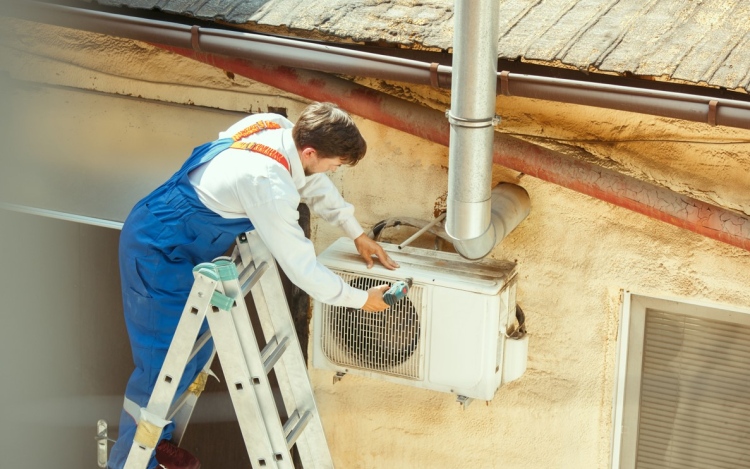It’s the middle of summer, and the weather outside is sweltering. You’re inside enjoying the cold air provided by your air conditioner when it suddenly stops working. How do you know if the problems you’re air conditioner is having are typical for an air conditioner of that age? If you understand the frequency of air conditioning repair, you’ll be well-prepared to face this common scenario.
Common Repairs
There are many common repairs that HVAC systems need. Typically, these repairs are inexpensive and quick. Leaking refrigerant is one common HVAC problem that many air conditioners experience at some point. In many cases, the leak in the refrigerant line can be found easily, allowing you to enjoy a cool home once again. Imbalanced blower fans, clogged condensate drains, and dirty evaporator coils are other common repairs needed on modern HVAC systems. Though many of these problems are inconvenient, an HVAC professional can typically get it repaired within an hour or so. Typically these types of repairs require replacing minor parts. As long as the professional has the parts, they are typically able to repair it on the same day that they diagnose the problem. Additionally, they typically only charge you for the cost of the part and the labor so you don’t have to worry about being upcharge for the part.
Repair Frequency
When it comes to the expected frequency of repairs, there’s really no hard and fast rule. Since all of the components in an HVAC system are technically designed to last the same amount of time, you may never need significant air conditioner repair. Part of this is due to the environment that the system runs on as well as how often it runs. However, unavoidable events such as natural catastrophes can result in issues repeating themselves over and over again. While you should schedule routine maintenance once a year, you may go 3-4 years or longer without so much as a single unexpected problem from your air conditioner, or it may be every few months if your air conditioner is on its last legs. That being said, even if your system doesn’t seem to be having problems, you should still have regular maintenance done on it to tune up the system and prevent issues that may be costly in the future. Additionally, the older it gets the more repairs it may need. However, while it is in warranty, it is likely that it’s cheaper to get it repaired than it would be to replace it before the warranty is up.
Potential Problems
Of course, while you theoretically shouldn’t have problems with your air conditioner, the reality is often much different. For example, the compressor may fail, meaning that your air conditioner can’t remove the heat from your home, resulting in a warm house. Your evaporator coil may also crack, requiring replacement or significant repairs before your air conditioner will operate properly. Unless you are a trained professional, it can be challenging to troubleshoot such issues on your own and you may not be able to accurately detect what is going on. With that being the case, it’s ideal to track when you seem to have problems, such as the time of day or the temperature outside compared to that of the inside. That way, when you contact a professional HVAC contractor, they can better understand your situation and better diagnose your problem.
How To Protect Your Air Conditioner
Aside from scheduling routine maintenance for your air conditioner at least once a year, there are a few other steps you can take to help prevent repairs. Changing your air filter regularly is a great do-it-yourself task that will protect the integrity of your system. You can typically buy one or two filters at a time at most any home improvement stores and in some general stores such as Walmart. Before purchasing a filter, look at the filter that is currently installed to identify the size and type that you need for your system. The filter typically needs to be replaced annually but if you live in a particularly dusty area where the wind blows dust into your home frequently, you may want to check your filters more frequently. Cleaning the condensate drain using bleach when you replace your air filter will also help your system avoid problems. Additionally, avoid placing resting things against the coils or near the ventilation gates to prevent any airflow restriction. Additionally, remove anything around it that may invite rodents or bugs near the HVAC system. That way you minimize the chance of a rodent causing unnecessary issues.
Doing Things Yourself
Good air conditioner maintenance starts with you. The first line of defense is simply observing your air conditioner for any unusual sights, smells, or sounds. Paying attention to your system will make it more likely that you’ll catch problems early so that they’re easier for your HVAC technician to fix. Even things like vacuuming and dusting your home can help decrease the amount of dust and dirt that gets into the filter of your system. With that being the case, it’s ideal if you keep your home clean. Many homeowners neglect cleaning the space that the Air Conditioner is in, especially if it is an outdoor system, so make sure that you are cleaning those areas too. Add that to the other at-home maintenance tips listed above, and you’ll be well on your way to enjoying many summers of consistent comfort.




